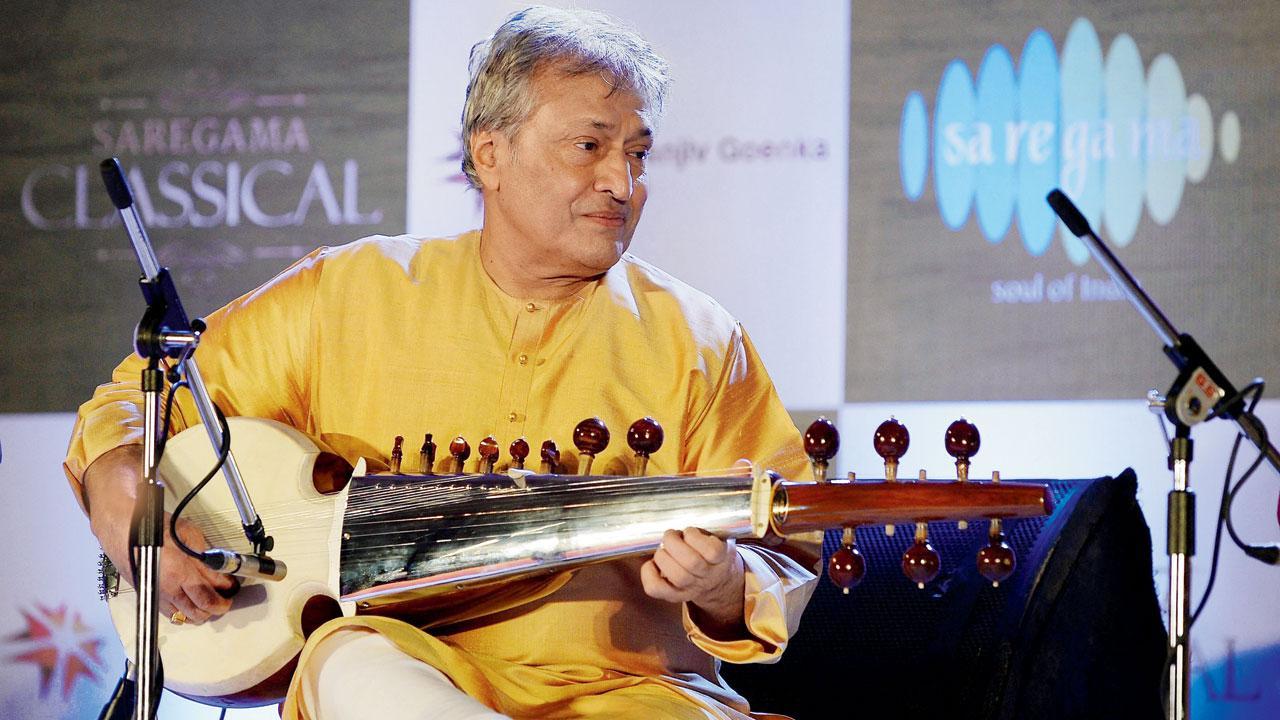An attempt to heal those in pain is a recurring theme in conversations with Ustad Amjad Ali Khan, whose latest album, Navras too aims to ‘bring peace’

Ustad Amjad Ali Khan
An amalgamation of songs that employ melody to represent human emotions, Ustad Amjad Ali Khan’s upcoming album, Navras promises to be a spiritual journey. In an interview to Mid-day, he says the instrumental project was created to transcend language barriers between the performer and listener. Edited excerpts of the interview:
ADVERTISEMENT
While music can evoke emotions, how difficult is it to represent emotions through it?
Musical vibrations can convey moods and emotions and have the ability to mould and shape our consciousness. Different types of music have different effects on the mind. Some of them are positive; others are negative. Our mind is like a living organism - it must be nurtured, and needs stimulation to grow. Music is one of the most important ‘foods’ for the intellect. It also has many faces. Conversation, recitation, chanting and singing are all part of music.
The nine states of emotional empowerment celebrate all the human emotions that have been part of every human being’s experience and existence. In this album, I have presented nine ragas for nine moods - Raga Shiv Kalyan, wonder/Adhuta Raga Darbari, joy/Hasya Raga Narayani, courage/Vira Raga Malkauns, sadness/Karuna Raga Pilu, anger/Raudra Raga Bahar, fear/Bhayanaka Raga Mia Ki Malhar, disappointment /Vibhasta Raga Tilang and peace/Shanta Saraswati. I would, however, clarify that these are my [perceptions]. For example, I have bracketed Raga Mia Ki Malhar as fear, after seeing the situation that arises during floods and calamities. However, rains can also [be perceived as] romantic.
What role has virtual concerts played in uplifting spirits during this time?
I think that what Teacher’s Glasses and PayTM Insider are doing is relevant. Virtual concerts have come to fruition at a time when humanity will need to consider meditation and contemplation, in the wake of this pandemic. I am glad to be able to contribute in bringing serenity and peace. While I pray for the world to heal and overcome this crisis, I look at this situation as a lesson for us to learn from. We will come out of this as better versions of ourselves.
How has the period of lockdown been for you personally?
The lockdown has enabled me to develop a deeper connection with my music, given that there were less distractions. I was also not travelling. I have certainly been able to meditate with music in a more profound manner. Despite a lifetime with the sarod, I see many fresh avenues opening up, because I am more mindful today than ever before. Apart from sticking to my daily music sessions, I am trying to reinvent myself.
Noticing your grandchildren learn the art, do you see contemporary influences in their approach to music?
Abeer and Zohaan have been working hard and are delightful disciples, despite their online educational commitments. They gave me a surprise by recording a track called, Our love, for my birthday. The current times have been challenging, and it is amazing to see how children have adapted to the new normal. When the planet heals and the human race recovers from the pandemic, I look forward to creating more music with my grandchildren, just like I did when Amaan and Ayaan were of their age.
 Subscribe today by clicking the link and stay updated with the latest news!" Click here!
Subscribe today by clicking the link and stay updated with the latest news!" Click here!






